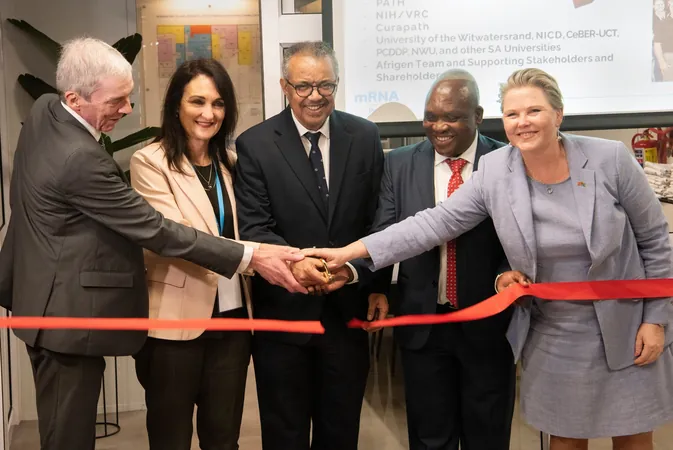
Are We Ready for the Next Pandemic? Inside the mRNA Technology Transfer Programme
2024-10-11
Author: Sophie
Global Health Security at Stake
The concept of this Programme originated during the COVID-19 pandemic, where it became starkly evident that many LMICs were unable to produce their own vaccines. A significant part of the initiative includes the South African Consortium, composed of entities like Afrigen, Biovac, and the South African Medical Research Council (SAMRC). This consortium is tasked with developing advanced mRNA vaccine technologies optimized for the unique needs of LMICs.
Key Objectives of the Programme
The Programme has set forth four primary objectives: 1. Establish sustainable mRNA manufacturing capacity in regions with limited production ability. 2. Introduce new technologies and promote research and development (R&D) in LMICs. 3. Strengthen regional biomanufacturing capacity through knowledge-sharing and workforce development. 4. Enhance regulatory capabilities to support vaccine approval and distribution in LMICs.
Governance and Oversight
WHO plays a pivotal role in overseeing the Programme and regularly updates its member states. The initiative also involves a Scientific and Technical Review Committee (STeRCo), which offers technical guidance and evaluation of mRNA technologies, ensuring that decisions align with the strategic goals of the Programme.
Engaging Local Expertise
In an effort to strengthen local ownership, the Programme has included voices from the South African Government and Africa CDC in the STeRCo, ensuring decisions are reflective of local needs. An mRNA Scientific Advisory Committee (mSAC) has also been created to provide expert insight into the mRNA development process.
Knowledge Sharing: A Foundation for Success
Empowering LMIC partners through knowledge sharing is fundamental to the Programme's ethos. Companies like Afrigen and Biovac, both partially state-owned, are pivotal in developing and transferring mRNA technology. This involves collaborating with 14 companies and providing comprehensive training on advanced mRNA technologies.
The Road Ahead: Sustainability and Future Challenges
However, maintaining the momentum and ensuring the Programme’s sustainability presents challenges. The mRNA manufacturing facilities must remain active even between pandemics, cultivating a market for mRNA products to avoid reliance on indefinite subsidies. This requires fostering a robust ecosystem within LMICs, adapting policy frameworks, enhancing regulatory bodies, and building local capacities.
Conclusion
The mRNA Technology Transfer Programme stands as a beacon of hope, aiming to rectify global health disparities by giving LMICs the tools they need to combat health crises independently. As the Programme gears up for long-term viability, its successes may very well lay the groundwork for resilient health systems worldwide, paving the way for a healthier future. Stay connected with our network as we delve deeper into the intricacies of health policy and global health security. Are you prepared for the next global health challenge?









 Brasil (PT)
Brasil (PT)
 Canada (EN)
Canada (EN)
 Chile (ES)
Chile (ES)
 España (ES)
España (ES)
 France (FR)
France (FR)
 Hong Kong (EN)
Hong Kong (EN)
 Italia (IT)
Italia (IT)
 日本 (JA)
日本 (JA)
 Magyarország (HU)
Magyarország (HU)
 Norge (NO)
Norge (NO)
 Polska (PL)
Polska (PL)
 Schweiz (DE)
Schweiz (DE)
 Singapore (EN)
Singapore (EN)
 Sverige (SV)
Sverige (SV)
 Suomi (FI)
Suomi (FI)
 Türkiye (TR)
Türkiye (TR)